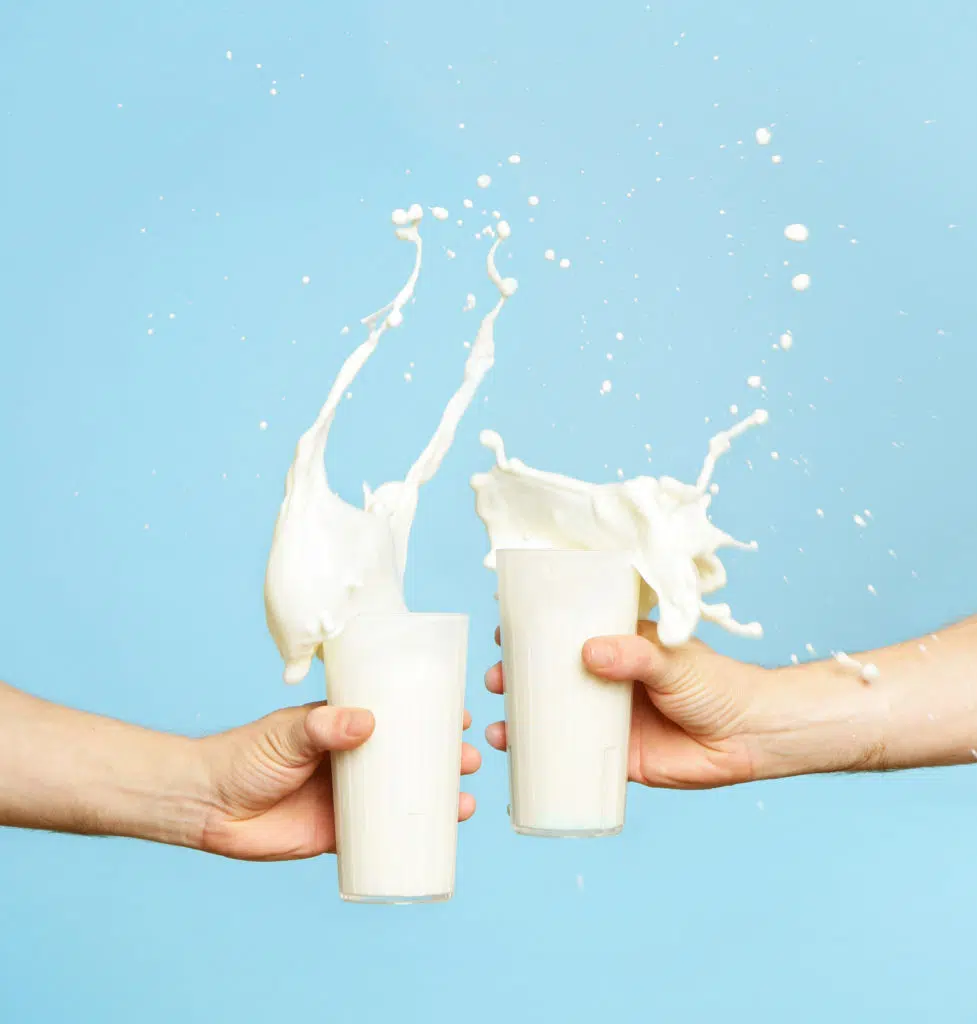If you’ve swapped your cow’s milk for goats milk or a plant-based alternative recently, you’re not alone! Research shows that 1 in 3 Brits now drink plant-based milk1https://www.foodbeverageinsider.com/fruits-vegetables-nuts-seeds/oat-overtakes-almond-plant-based-milk-sales-soar-uk.
But how do different types of milk stack up? Are plant-based ‘milks’ a suitable nutritional replacement for traditional dairy milk? In honour of world milk day, let’s take a look!
Why do we drink milk?
Milk is packed full of nutrients and has been a household staple for generations across the western world2https://www.ncbi.nlm.nih.gov/pmc/articles/PMC2722739/. The benefits of (dairy) milk consumption for your health have been – and still are – widely researched and promoted. Milk contains a variety of nutrients that can help support your health and reduce your risk of common nutrient deficiencies3https://www.ncbi.nlm.nih.gov/pmc/articles/PMC6060686/ from protein and fat to vitamin B12, B2, calcium, phosphorous, potassium, iodine and more4https://www.dairycouncil.co.uk/consumers/faqs/what-nutrients-does-milk-contain. Your choice of milk type might be influenced by health reasons, ethics, diet or plain old personal preference – nowadays there is a milk for everyone.
Let’s compare!
Below you’ll find a table comparing the nutrient composition of 100ml of goat5https://www.tesco.com/groceries/en-GB/products/260454237, cow6https://www.tesco.com/groceries/en-GB/products/252207566, almond7https://www.tesco.com/groceries/en-GB/products/272012512, soy8https://www.tesco.com/groceries/en-GB/products/253528288, coconut9https://www.tesco.com/groceries/en-GB/products/309186491 and oat milk10https://www.tesco.com/groceries/en-GB/products/302330090.
| Goat (whole) | Cow (whole) | Almond | Soy | Coconut | Oat | |
| Energy | 61kcal | 66kcal | 22kcal | 39kcal | 50kcal | 57kcal |
| Fat | 3.5g | 3.7g | 1.1g | 1.8g | 1.2g | 2.8g |
| of which saturates | 2.4g | 2.4g | 0.1g | 0.3g | 1g | 0.3g |
| Carbohydrates | 4.3g | 4.7g | 2.4g | 2.5g | 9.8g | 6.6g |
| of which sugars | 4.3g | 4.7g | 2.4g | 2.5g | 4.1g | 4.1g |
| Fibre | 0g | 0g | 0.4g | 0.5g | 0.2g | 0.8g |
| Protein | 2.8g | 3.5g | 0.4g | 3g | 0.1g | 1g |
| Calcium | 120mg | 124mg | 120mg* | 120mg* | 120mg* | 120mg* |
* These milks are fortified with calcium.
As you can see, the nutrient profiles differ greatly. Of course, variations will occur between brands, so do have a look next time you’re in the supermarket.
Dairy milk provides the most energy and fat, while coconut and oat milks provide more carbohydrates. All four plant-based milks provide a little bit of fibre, while goat, cow and soy milks provide more protein.
Dairy milks are also a great source of other nutrients such as phosphorous, potassium, iodine, vitamin A and magnesium11https://draxe.com/nutrition/goat-milk/, while plant-based alternatives often are not. That being said, many plant-based milks these days are fortified with calcium and vitamin B12 – (nutrients typically found in dairy) as well as vitamin D. Research also shows that emulsifiers, which we often find in plant-based milk to increase shelf-life, can have negative effects on your gut bacteria12https://www.medicalnewstoday.com/articles/324232, so if you can – make your own plant-based milk at home to avoid the additives.
So, which one should I go for?
All milks have their pros and cons. Nutritionally speaking, plant-based milks are not a like-for-like replacement for dairy milk. They can be a great addition however; adding alternative kinds of milk into your diet is a great way of increasing flavour and diversity.
As you know, we’re a fan of goats’ milk here at Chuckling Goat, and it forms the base of our Kefir! Goat milk is nutrient-rich and has hypoallergenic properties due to the A2 casein content, making it less inflammatory than cow milk13https://www.sciencedaily.com/releases/2007/07/070730100229.htm. You can read more here about 7 reasons why you should be eating goat dairy rather than cow dairy, and 5 health benefits of goat milk.
Take away messages
- Plant-based milks are not like-for-like nutritional replacements for dairy milk
- Emulsifiers added to plant-based milks can have a negative effect on your gut – make your own if possible!
- Goats milk is less inflammatory than cow’s milk
References
- 1
- 2
- 3
- 4
- 5
- 6
- 7
- 8
- 9
- 10
- 11
- 12
- 13














